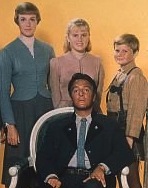Wednesday, October 31, 1978.
THE SOUND OF MUSIC. Written by Ernest Lehman, adapted from the stage musical by Howard Lindsay and Russel Crouse. Based on the book The Story of the Trapp Family Singers, by Maria von Trapp. Music by Richard Rodgers, with lyrics by Oscar Hammerstein. Directed by Robert Wise. Running time: 174 minutes. Rated General entertainment.
Raindrops on roses and whiskers on kittens;
Bright copper kettles and warm woolen mittens;
Brown paper packages tied up with string;
These are a few of my favourite things.
Bright copper kettles and warm woolen mittens;
Brown paper packages tied up with string;
These are a few of my favourite things.
HEATHER MENZIES. NOW, THAT name sounds familiar.
Until Thursday, the Toronto-born beauty was on view at the Coronet in a thriller called Piranha [1978]. She played Maggie McKeown, a professional skiptracer, and in one scene, she is really on view.
Together with co-star Bradford Dillman, she is being held prisoner by the army. Of course, they want to escape. Dillman's character says "create a diversion."
What's a girl to do? Heather steps up to the guard, smiles sweetly and opens her blouse. While the guard is staring at a pair of his favourite things, Dillman bashes him over the head.
Heather Menzies. If you've ever read the cast credits at the end of The Sound of Music, you've seen the name. She's listed among "The Children."
A ballet student, she made her screen debut in the 1965 musical playing fellow Torontonian Christopher Plummer's second daughter and third child, 13-year-old Louisa.
Together with Charmian Carr (Liesl, 16 going on 17), Nicholas Hammond (Friedrich, 14), Duane Chase (Kurt, 11), Angela Cartwright (Brigitta, 10), Debbie Turner (Marta, 7) and Kym Karath (Gretl, 5), she was part of the Trapp Family saga, one of the most effectively engineered entertainments ever put on film.
It is the story of Maria (Julie Andrews), a misfit novice nun, who is sent from the abbey near Salzburg to work as a governess in the von Trapp mansion. Georg von Trapp (Plummer) is a widowed naval captain with seven children.
With her she brings music, laughter and, eventually, love. The rush of events in 1930s Austria brings on the film's conflict as the nationalistic von Trapps are forced to flee the Nazi-driven Anschluss.
Adapted from the 1959 Broadway musical, the movie's irresistible appeal is the result of a number of proven ingredients. Nuns provide wholesome whimsy, with an air of divine approval.
Nazis are villainy incarnate. Families, especially big ones, represent stability, security, love and warmth. And no one has to tell a Vancouverite about the appeal of mountains.
Even so, it takes a lot of talent to craft such a sure-fire confection properly. Credit Richard Rodgers and Oscar Hammerstein II with being master bakers who solve the central problem of any musical play — making the songs an integral part of the story.
What distinguishes a Rodgers and Hammerstein collaboration is the way in which the songs proceed from the the book, filling in and furthering it, a quality that has made standards of South Pacific, Oklahoma!, The King and I and Carousel. Their music is the heartbeat that gives life to The Sound of Music.
Such an integration of elements is most obvious when it is missing, as it is in the still current Grease [1978], a slice of cinematic tripe where the songs appear as if on a numbered schedule, programmed in one or two per reel. They have about as much relevance to the main story as the rock singers do to the Armenian jugglers on the old Ed Sullivan Show.
Up front and making it all work is the incomparable Julie Andrews. Not since Mary Pickford skipped across the silent screen as Pollyanna [1920] has there been a more perfect heroine. And Andrews has the advantage of a fine singing voice.
A crowd-pleaser since its first release, The Sound of Music is worth seeing again. Totally committed to creating a lump in your throat and bringing tears to your eyes, it celebrates entertainment writ large.
The above is a restored version of a Province review by Michael Walsh originally published in 1978. For additional information on this archived material, please visit my FAQ.
Afterword: Honestly, I never expected the above review to see the light of day. On October 30, 1978, no one in the newsroom expected there to be any papers on the street the next morning. Union negotiations were not going well, and the collective agreement expired on October 31. Informed opinion favoured a strike/lockout at midnight. Turning in a review of The Sound of Music was meant as something of a joke. Leading off with a reference to actress Heather Menzies (whose appearance on the cover of the August 1973 Playboy magazine dramatically changed the 23-year-old's child star image), was me being flip in the face of impending unemployment. As it turned out, The Province (Vancouver's morning newspaper), made its deadline, and rolled off the presses before midnight. The Vancouver Sun (an afternoon paper) did not, marking the beginning of the city's longest newspaper strike.
